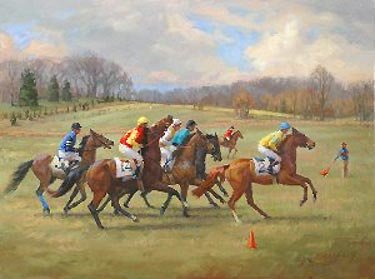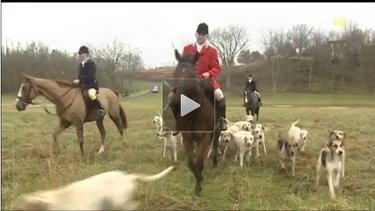
Linda Volrath, Bundled at the Races, oil on panel, 2008
On Friday, a new issue of Norman Fine’s Foxhunting Life appeared on-line, featuring a lead article by Linda Volrath, a well-known local artist, on “Equestrian Sports and Oil Paintings.” My wife Karen was somewhat startled to recognize herself as the figure in the foreground of the painting.
Ms. Volrath’s painting was inspired by a photograph taken at the 59th Running of Blue Ridge Hunt Point-To-Point Races at Woodley in Berryville, Virginia on March 8th 2008.
Karen and I had just become members of the Blue Ridge Hunt that season, and we were already drafted into serving as officials at the races. I was registering entries and issuing numbers. Karen was in charge of the trophies.
The weather was dark and chilly that day, and thunderstorms were predicted.
Sure enough, midway through the races, the heavens opened and violent winds buffeted the field. So powerful were the blasts of wind that a Porta Potty was actually blown over with a prominent local physician inside. He was photographed grinning gamely on his emergence, his trousers stained with blue disinfectant (Photograph 116 in Karen’s photo essay).
The storm even included an interval of golf ball-sized hail.
The Volrath painting shows Karen holding on to her hat in the high winds with aid of an ancient, moth-damaged Yale club scarf. Eventually, the storm passed, and the races were successfully concluded.
Karen was naturally amused to find that her image had been recorded in oils by someone whom (at the time) she had never met. She inquired about purchasing the painting, but the artist regretfully informed Karen that the painting had been sold very soon after its completion at a gallery in Annapolis.
It’s really quite a nice painting, too.
————————————
There is clearly some kind of artistic connection between Karen and thunderstorms.
A number of years ago, Maine artist Tom Hennessey executed in water-colors a painting of a dramatic incident featuring Karen landing a salmon on the Restigouche River in a thunderstorm.
We were fishing Red Pine Lodge’s pools from a 26′ Sharpe canoe, and it began to rain lightly just as I was starting my turn casting. I handed the 12′ Payne to Karen to hold for me, while I slipped on my jacket, and she insolently flipped out a short cast next to the canoe.
The red gods could not resist the opportunity for a joke, so instantly up came a salmon and seized the fly. (We’d been fishing for three days without the slightest action.)
The rain rapidly intensified, and soon it was coming down in torrents. The salmon ran powerfully downstream, out of the pool, and we were forced to raise the anchor and follow him.
Karen fought the salmon for ten or 15 minutes as we traversed hundreds of yards of river. Finally, he seemed to be beginning to tire, and the guide beached the canoe by a slow drift which seemed like a convenient location to try to land the fish.
As the storm intensified, one bolt of lightning after another began to strike the trees on top of the mountains above us, and I strongly urged Karen to get out of the river, at least, and stand on the beach (though I was far from confident of the effectiveness of such a precaution).
(I recall thinking that I was very happy about my reactionary preference for wooden fly rods, knowing what an excellent conductor graphite is.)
The guide was bent over and cringing, in his rain gear, and manifested no desire to get near enough to the river to net the fish but, finally, threats and encouragement prevailed. Karen reeled in the mighty salmon. The guide netted it, and the salmon was duly unhooked and released. (The Restigouche counts as New Brunswick water and has a no-kill policy on salmon.)
We returned to camp, soaked to the skin, but triumphant and alive.
Appropriately enough, the fly that Karen caught the salmon on was a Thunder and Lightning. The actual fly that took the salmon is mounted in the mat around the painting.



















